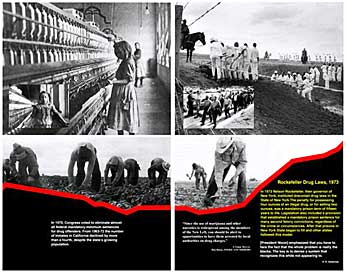Site Unseen: Incarceration: Difference between revisions
No edit summary |
No edit summary |
||
| Line 3: | Line 3: | ||
====Region: [[:Category:North America|North America]]==== | ====Region: [[:Category:North America|North America]]==== | ||
====Subject: [[:Category:Political/Economic/Social Opinion|Political/Economic/Social Opinion | ====Subject: [[:Category:Political/Economic/Social Opinion|Political/Economic/Social Opinion]]==== | ||
====Medium: [[:Category:Mixed Media|Mixed Media]]==== | ====Medium: [[:Category:Mixed Media|Mixed Media]]==== | ||
| Line 33: | Line 33: | ||
[[Category:Political/Economic/Social Opinion]] | [[Category:Political/Economic/Social Opinion]] | ||
[[Category:Mixed Media]] | [[Category:Mixed Media]] | ||
Latest revision as of 17:47, 11 November 2016
Date: 2005
Region: North America
Subject: Political/Economic/Social Opinion
Medium: Mixed Media
Artist: Sheila Pinkel (b.1945)
Confronting Bodies: Chief Administrator of the Parole Office
Date of Action: July 2005
Location: T.H. Pendergast California Parole Museum in Diamond Bar, CA, USA
Description of Artwork: Pinkel's mural, Site Unseen: Incarceration, contained images of a whipped black slave and racism towards the Japanese prior to and during WWII
The Incident: Pinkel was invited to contribute to an exhibit at the Parole Museum commemorating 100 years of parole in California. Her submission was a mural illustrating conflict in the U.S. through history. The Administrator of the Parole Office decided the images were too "disturbing" and the mural should be removed from the exhibit. Pinkel agreed the mural was disturbing, however, that was an important part of her artistic message.
Results of Incident: The mural was allowed to remain on display for the opening event, but was removed the following day.
Source: Artist Sheila Pinkel
